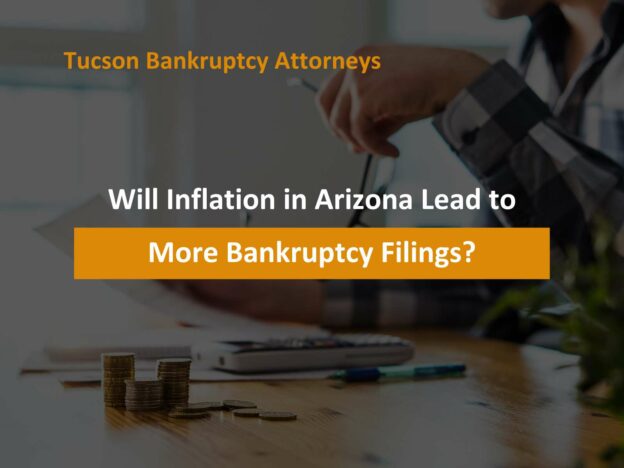Inflation has been a growing concern in the United States, and its impact is being felt across the nation, including in the state of Arizona. With rising prices for everyday goods and services, many Arizonans are finding it increasingly challenging to make ends meet. This financial strain has led some individuals and businesses to consider bankruptcy as a potential solution to their growing debt problems. In this article, we will explore the relationship between inflation in Arizona and the potential increase in bankruptcy filings. Additionally, we will touch upon the importance of consulting a Tucson bankruptcy lawyer and the process of filing bankruptcy in Pima County.

Understanding Inflation in Arizona
Before delving into the connection between inflation and bankruptcy, it’s crucial to understand the current economic climate in Arizona. Like the rest of the country, the state has been experiencing inflationary pressures, leading to higher prices for goods and services. Inflation erodes the purchasing power of consumers and can strain household budgets, making it difficult for individuals to meet their financial obligations.
Inflation impacts various aspects of daily life, including housing costs, transportation expenses, and even the price of groceries. As these costs rise, many Arizonans find themselves grappling with increased debt and financial stress, which can eventually lead to bankruptcy considerations.
The Role of a Tucson Bankruptcy Lawyer
For individuals and businesses facing overwhelming debt, consulting a Tucson bankruptcy lawyer is a critical step in exploring their options. A bankruptcy attorney in Tucson, Arizona, can provide expert guidance and legal advice tailored to each client’s unique financial situation. These professionals specialize in bankruptcy law and can help individuals and businesses understand their rights, responsibilities, and the various types of bankruptcy available to them.
Bankruptcy attorneys play a pivotal role in assisting their clients throughout the bankruptcy process, from evaluating the eligibility for bankruptcy to representing them in court if necessary. Their expertise in navigating the complex legal procedures involved in bankruptcy filings is invaluable.
The Connection Between Inflation in Arizona and Bankruptcy
The relationship between inflation and bankruptcy is multifaceted. As inflation continues to rise, individuals and businesses may face the following financial challenges that can lead to bankruptcy considerations:
- Increased Cost of Living: Inflation drives up the cost of living, making it more expensive for households to cover their basic needs, such as housing, food, and utilities. As these expenses increase, individuals may turn to credit cards and loans to bridge the gap, leading to mounting debt.
- Wage Stagnation: In many cases, wages do not keep pace with inflation. This means that even though prices are rising, people’s incomes may remain stagnant, resulting in a decreased ability to cover their expenses. The gap between income and expenses can push individuals toward bankruptcy.
- Business Struggles: Inflation can negatively impact businesses by increasing the cost of production and reducing profit margins. Smaller businesses, in particular, may find it challenging to adapt to these changes, leading to financial difficulties and, potentially, bankruptcy.
- High-Interest Rates: To combat inflation, central banks may raise interest rates, making borrowing more expensive. For individuals and businesses with existing debt, higher interest rates can result in increased monthly payments, making it even more difficult to manage their finances.
The Types of Bankruptcy in Arizona
In Arizona, individuals and businesses considering bankruptcy have several options to choose from, each with its eligibility criteria and benefits. The two primary types of bankruptcy available to individuals and some small businesses are Chapter 7 and Chapter 13 bankruptcy:
- Chapter 7 Bankruptcy: Also known as “liquidation bankruptcy,” Chapter 7 allows individuals to discharge most of their unsecured debts, such as credit card debt and medical bills. Assets not protected by exemptions may be sold to pay off creditors. Chapter 7 bankruptcy can provide a fresh start for those with overwhelming debt, but is subject to income eligibility requirements.
- Chapter 13 Bankruptcy: Chapter 13 bankruptcy is often referred to as “reorganization bankruptcy.” It allows individuals to create a manageable repayment plan to gradually pay off their debts over a three to five-year period. This type of bankruptcy is suitable for individuals with a regular income who want to protect their assets while addressing their debt.
Pima County in Bankruptcy Filings
Pima County, located in southern Arizona, encompasses Tucson, the state’s second-largest city. As the economic challenges of inflation persist, Pima County residents may find themselves increasingly seeking bankruptcy relief. Filing bankruptcy in Pima County follows the same federal bankruptcy laws as the rest of the nation, but may involve local processes and procedures specific to the county.
Individuals considering bankruptcy in Pima County should be aware of the following key aspects:
- Local Bankruptcy Courts: Pima County has its bankruptcy court, where bankruptcy cases are filed and heard. This court operates under the jurisdiction of the United States Bankruptcy Court for the District of Arizona.
- Bankruptcy Exemptions: Bankruptcy exemptions determine which assets individuals can protect from liquidation during Chapter 7 bankruptcy. Arizona has its set of exemptions, which can be different from those in other states. Consulting a Tucson bankruptcy lawyer can help individuals understand and maximize their exemptions.
- Credit Counseling for Pima County Bankruptcies: Before filing for bankruptcy, individuals must complete a credit counseling course from a court-approved provider. Pima County residents can access local resources and organizations that offer these courses.
Contact Our Tucson Bankruptcy Law Office Today
Inflation in Arizona, including Pima County and Tucson, has created financial challenges for individuals and businesses alike. The rising cost of living, stagnant wages, and other economic pressures can lead to mounting debt and financial distress. As a result, bankruptcy considerations are becoming increasingly common.
Navigating the complex process of bankruptcy in Pima County requires the guidance of a knowledgeable Tucson bankruptcy lawyer. These legal professionals play a crucial role in helping individuals and businesses explore their bankruptcy options, understand their rights and responsibilities, and work towards a more stable financial future.
While the relationship between inflation and bankruptcy is complex, seeking professional legal advice is a vital step for those facing overwhelming debt. As inflation continues to affect the financial landscape in Arizona, the assistance of Tucson Bankruptcy Attorneys can make all the difference in finding a path to financial recovery. Contact us today for free consults and zero-down bankruptcy options or call us for assistance: 520-307-0020.
TUCSON BANKRUPTCY ATTORNEYS
2 East Congress Street, Suite #900-6A
Tucson, AZ 85701
Office: (520) 307-0020
Website: https://tucsonbankruptcyattorney.co/

